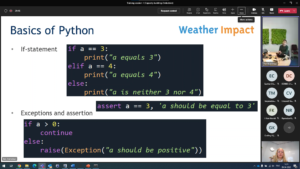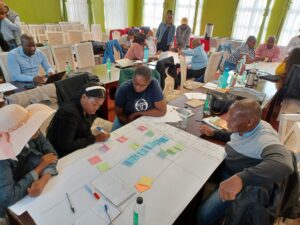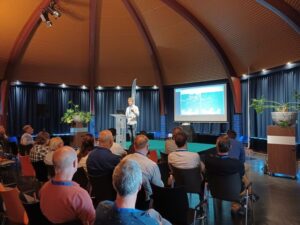Capacity building
It is our priority not only to deliver a reliable and good quality ICT solution, but also to train the relevant staff and organizations to optimally benefit from the information and tools provided. We build partnerships with public and private organizations and contribute in strong value-adding service chains.
To increase the capacity of people and organizations working with our services, we undertake capacity development at different levels.
- We support building up capacity, for example staff members of Meteorological Agencies, with capacity interventions. These are often multiple-day sessions on the topics of Ensemble Numerical Weather Predictions, validation and evaluation of weather models, programming, ICT solutions and development of Public Private Partnerships.
“There is a real added value in helping our local partners to build up capacity and give them the needed training, so they can understand and use our services provided in the right way”
- We organize practical trainings with our local-partner organizations on the topics of weather forecasting, agro-meteorological services and decision making under uncertain circumstances. These are often train-the-trainer sessions to pass the knowledge on to extension officers or development agents (the trainers), who in their turn are in contact with farmers. The farmers are finally supported in understanding the weather information provided to them. In this way, a cascade of knowledge transfer is being generated and embedded in the local context.
- In the process of developing agro-meteorological services, it is key to bring together agronomist knowledge with meteorological knowledge. To enable this, we organize different co-creation workshops with relevant partners. During such workshops, the goal is to exchange agronomic and meteorological knowledge, to define and design new operational models for crop advisories or services.
Example: Burundi
Weather Impact conducted a series of trainings on the content, use and interpretation of weather information within agriculture. The trainings are delivered to all AUXFIN staff: key, master and super activators. Key activators will then disseminate the information to the farmers using specifically designed digital tools. Super- and master activators supervise key activators. Additionally, Weather Impact carried out one higher-level training to the national meteorological institute (IGEBU, Institut Géographique du Burundi).
In total, 15 trainings are given to ca. 800 activators. Key activators have direct contact with the G50 farmers (groups of 50 households) and needs to be able to explain the AgriCoach and the weather information in there directly to them. In the end, 500.000 farmer households are empowered with essential climate information. We anticipate that our trainings strengthen the value that Burundian smallholder farmers can obtain from AgriCoach.
Read more about capacity building in Burundi.
Example: Southern Africa
Weather Impact and Aqualinks organised the event “DCAS Training to Support Climate Resilience for Smallholder Agriculture in Southern Africa”, to bring together public and private high-level key change makers from the Southern African region, who have the capacity to implement and scale up DCAS. Objectives were to share knowledge and encourage stakeholders in Southern Africa to adopt DCAS, by showcasing best practices and succesful case studies that integrate DCAS into their climate resilience strategies.
Read more about capacity building in Southern Africa.
Example: Zimbabwe
The Zimbabwe Meteorological & Agricultural Departments required training on the use of agro-meteorological information to create Digital Climate Advisory Services. Weather Impact has developed several training sessions and aims to build capacity at the meteorological and agricultural institutions to generate these digital services. Topics that are covered are the use of open source data and software, accessing and processing meteorological data, generation of agro-meteorological advisories, dissemination of information, and more.
“Great facilitation skills, content well prepared and the concepts covered are important in solving DCAS challenges in Zimbabwe.”
Shylock Muyengwa – Zimbabwe Evaluation Association
Read more about capacity building in Zimbabwe.
Example: Lesotho
Capacity building in Lesotho is set up to train participants with various backgrounds, such as the Lesotho Meteorological Service (LMS), the Ministry of Agriculture and Food Security (MAFS), Burea of Statistics and agro-extension officers from across the country. Weather Impact developed trainings to create local ownership of agro-weather tools, and facilitate sustainability after the project ends. By combining all expertise of the different stakeholders and strengthen their collaboration and capacity, agro weather tools can be implemented and used succesfully. This way Weather Impact contributes to the legacy of the service.
“It has been so great to be in this training and this is going to help us to help our farmers to plant their crops in the right timing in line with weather expectations, and do the cropping activities the right way.”
Read more about capacity building in Lesotho.
Example: the Netherlands
Weather Impact and HydroLogic provide a training program on weather and water management for Dutch waterboards and municipalities. This training program focusses on the intersection of weather and water management and helps in decision making and taking preventive measures in time. The 3-day program is filled with interesting information on the weather system and weather forecasting, the use of weather information in water management, a basis on climate change and climate scenarios and practical sessions on the use of meteorological and hydrological information.
Read more about our work in the Netherlands.






